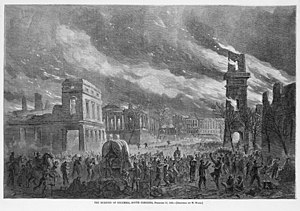Capture of Columbia
| Capture of Columbia | |||||||
|---|---|---|---|---|---|---|---|
| Part of the American Civil War | |||||||
 The Burning. |
|||||||
|
|||||||
| Belligerents | |||||||
|
|
|
||||||
| Commanders and leaders | |||||||
| William T. Sherman | Wade Hampton | ||||||
| Strength | |||||||
| 98,355 | About 500 | ||||||
The capture of Columbia occurred February 17–18, 1865, during the Carolinas Campaign of the American Civil War. The state capital of Columbia, South Carolina, was captured by Union forces under Maj. Gen. William T. Sherman. Much of the city was burned although it is not clear which side caused the fires.
Following the fall of Savannah, Georgia, at the end of his "March to the Sea", Maj. Gen. William T. Sherman turned his combined armies northward to unite with Lt. Gen. Ulysses S. Grant in Virginia and to cut General Robert E. Lee's supply lines to the Deep South. He planned to march through South Carolina to Columbia, then capture and destroy the Confederate arsenal at Fayetteville, North Carolina, before uniting with the XXIII Corps, commanded by Maj. Gen. John Schofield, at Goldsboro, North Carolina. To confuse the Confederates, he sent his left wing westward towards Augusta and his right wing eastward towards Charleston.
Confederate forces in South Carolina were part of the Department of the West, under the command of General P.G.T. Beauregard. He attempted to defend both Augusta and Charleston and divided his available forces between the two cities to defend them as long as possible. He hoped that doing so would give the Confederacy an advantage during negotiations at the Hampton Roads peace conference; he also thought that he could reconcentrate his forces if Sherman changed course for Columbia.
...
Wikipedia
